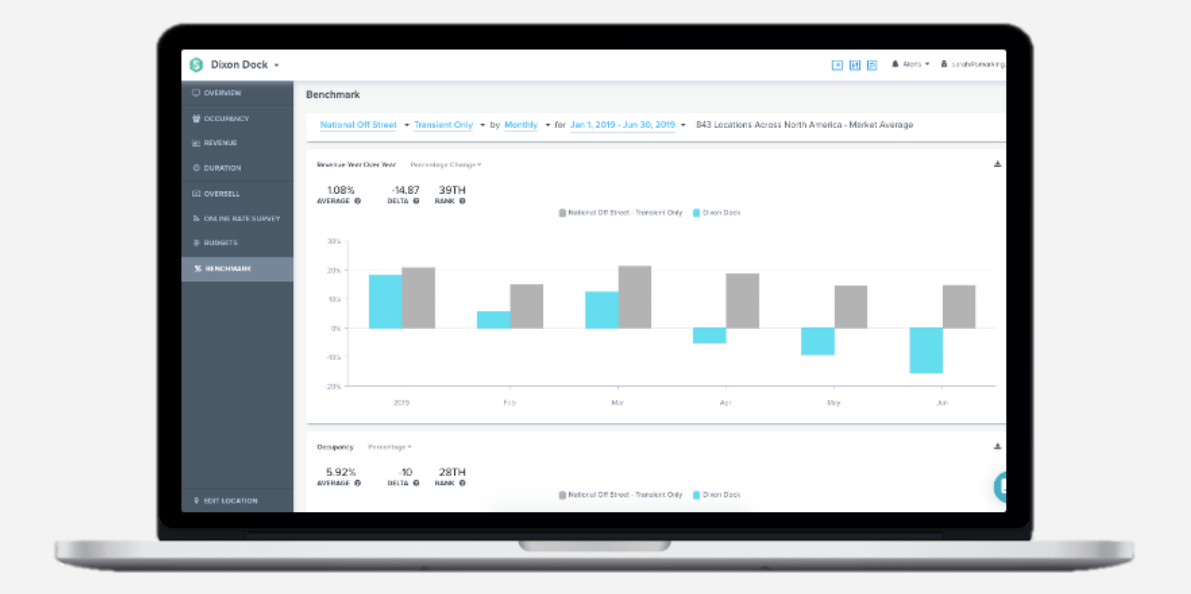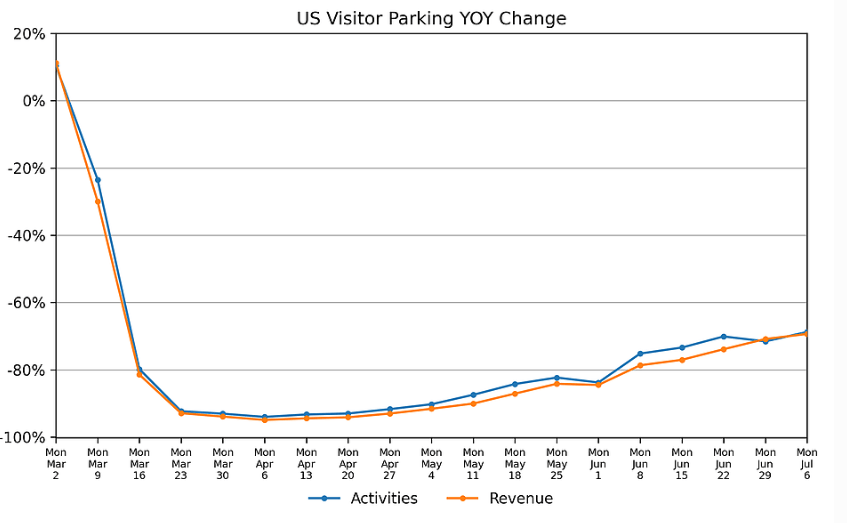A Data-Driven Renaissance for the U.S. Parking Industry
City Tech’s Millennium Gateway Innovation Lab Expands Data Focus, San Francisco-Based Smarking Joins Parking Innovation Consortium
COVID-19,
new transportation modes, and changing resident behavior are transforming urban
mobility at an unprecedented pace. Parking facility owners and operators must
find ways to stay relevant and viable, and new technology holds great promise
to help the parking industry evolve as a critical piece of the urban
transportation puzzle. The rise of connected
sensors, vehicle recognition, navigation guidance, digital payment platforms,
and other parking innovations are generating new data that may make-or-break
the parking industry’s future.
We’ve
watched data-driven transformations in core urban industries like tourism, finance,
and energy. The ability to collect,
share, analyze, and act upon newly available parking information is already
shaping today’s parking industry and determining tomorrow’s winners and losers.
Through its
Millennium Gateway Innovation Lab, City Tech Collaborative is exploring ways to
use parking data to improve operations, identify new product and service
opportunities, and position parking as a critical hub of urban transportation. City Tech
is pleased to welcome Smarking
, a San Francisco based parking
software company, as a new Millennium Gateway Industry Lead to co-develop parking
industry analysis and insights. Through partnerships with organizations
such as Smarking and other parking, mobility, technology, and policy leaders,
we are working to advance and support the industry’s efforts to improve facility
performance, support industry growth, and help make cities happier, healthier,
and more productive.
A 21st Century Role for an Age-Old Industry.
Until recently,
the lack of comprehensive market data made it easy to overlook the scale,
scope, economic impact, and potential contributions of the U.S. parking
industry. Hyperlocal markets, fragmented ownership, cash transactions, and underdeveloped
technology conspired to hide a transportation giant in plain sight. A
newly-published market sizing study commissioned by the National Parking
Association estimates the annual revenue of U.S. parking at a staggering $131
billion – approximately one-fourth
the size
of the entire U.S. automotive industry.
Meanwhile,
the COVID-19 pandemic has also underscored parking
as a critical service
for essential workers and as a major contributor to
local municipal finance. This understanding combined with NPA and Ernst &
Young’s insights, more investors, technologists, and municipalities are turning
to the parking industry as an untapped opportunity and finally recognizing the
impact parking has on the national economy. This renewed interest also
coincides with the industry’s focus on adapting to new transportation modes and
behaviors; those embedded in the parking industry as well as newcomers are
looking for ways to make smart technology investments, aid seamless transfers
between cars and other modes, and flexible space management.
The parking
industry’s reach and scale, combined with COVID-19’s impact and the overall
shifting mobility landscape, raise the need for data even more than before. Although
not as shiny as new technology investments, data standards and transparent data
sharing are critical to creating informed strategies, bridging fragmented
stakeholders, and lifting the industry around common goals as the future of
parking evolves.
Steps to Foster a Data-Driven Parking Industry Renaissance:
Recognizing the value of data insights to individual parking facilities and the overall industry, the Millennium Gateway Innovation Lab has identified three concrete steps to help create, adopt, and scale vital industry data.
1. Accelerate efforts to standardize definitions and metrics to enable broader data sharing and collaboration.
While most other industries have standardized data and benchmarks, the parking industry is at a crossroads to develop and adopt similar strategies. For example, the hospitality industry’s STR report compares performance of a hotel across comparable facilities; parking leaders can look to established examples such as these to understand market performance and trends. Indicators including market share and per-parking-spot revenue can inform strategy across facilities and entice new investors. Additionally, if relatively underperforming parking spots exist, this data can help justify the diversification of parking space utilization given future parking related mobility forecasts.
Quantifiable and standardized metrics can demonstrate the parking industry’s importance, and some organizations are already making great strides. Smarking’s Parking Industry Benchmark
is tracking daily parking vacancy rates in over 2,000 U.S. parking facilities as an indicator of economic recovery in cities following COVID-19 shutdowns. In addition, the British Parking Association, the European Parking Association, and the International Parking & Mobility Institute are creating uniform standards for sharing parking data across platforms for industry-wide adoption through the Alliance for Parking Data Standards(APDS).
Even with these efforts, the industry still faces barriers to accelerating adoption of broad data sharing and collaboration. Practices by Smarking and others include using anonymized data supplied by clients, but many organizations still hesitate to contribute their information. Now that the market for parking has been reliably sized, understanding market share and its various nuances is the next step in building a data-driven future. This can only be done through trust and collaboration among parking leaders for the greater whole of the industry.
2. Adopt
new information technology for data capture, analysis, and action.
The parking
industry is quickly growing and adopting new technology, but it is still common
to see paper tickets, cash-based systems, and parking attendants at facilities
today. Before we can create datasets rich enough to benefit the entire
industry, the industry must invest in technologies that capture and analyze
this data. While this task can be daunting for parking facility owners that have
yet to install Wi-Fi or network access, technology can be right-sized to a
facility’s budget and level of preparedness. City Tech is currently developing
a framework for parking leaders for such a cyberphysical foundation that takes
a strategic, scalable, and value-driven approach to hardware, software,
connectivity, data management, and utility infrastructure investments.
Investing in
such technologies also builds towards the larger goal of improving operational
efficiencies and creating additional revenue streams. In addition to its work
on establishing a data-driven Parking Industry Benchmark, Smarking’s Automated Yield
Managementsolution is providing dynamic pricing for parking facilities and
automatically updating rates based on demand. Providing customers with real
time occupancy and wayfinding maps can provide customers with an enhanced user
experience, while installing gateless entryway sensors can lessen congestion
during event parking and improve fare collection. Insights generated from these
technologies can help improve pricing, marketing, and staffing decisions which
drastically improve operations management within parking facilities. Taking on
these new technologies may feel overwhelming for some, which is why partnerships
and physical testbeds such as the Millennium Gateway Innovation Lab provide
opportunities to demonstrate, integrate, and scale technology while also
validating new business cases.
3. Expand collaborative innovation and cross-sector partnership to carry the industry forward.
No single actor can take on the challenge of creating, validating, and implementing data standards for an entire industry. The parking industry sits between private owners and operators, local governments’ interests, technology investors, and public use; creating both formal and informal collaborations can move the industry forward and make good on the opportunities ahead.
Many organizations within the parking industry have already leveraged the power of coordinated action. The National Parking Association’s recent success enabled parking to be classified as an essential businessunder the CARES stimulus bill. Smarking is helping parking and mobility leaders quantity the impact of COVID-19 and enabling lobbying efforts for recovery through the Urban Mobility Coalition, a coalition of over 18 cities who have united to request federal support. Both offer strategies that can serve as models for future government relations. Meanwhile, research-focused initiatives such as the aforementioned Alliance for Parking Data Standardsis bringing international organizations together to address common issues across the industry.
City Tech and our partners are shaping the parking industry through strategic partnerships and collaborative solution development. In addition to establishing a cyberphysical foundation and product development roadmap for parking asset owners, we are creating high-definition facility maps to improve wayfinding and test more complex solutions such as autonomous freight or valet services. We are also applying occupancy sensors, data analysis, and optimization for electric vehicle charging within parking facilities.
The parking industry is quickly adapting to the changing mobility landscape and proving its value to the world at large. Creating partnerships, testing technologies and business models, and developing solutions to complex problems will accelerate these efforts, but only if we have the right data to build sustainable strategies and measure their impact.
For more information on our work, please visit www.CityTech.org/Parking-Innovation
or email Collaborate@CityTech.org
to get involved.
About the Millennium Gateway Innovation Lab: The Millennium Gateway Innovation Lab is a groundbreaking partnership to shape the future of the parking industry and urban mobility. As a consortium of asset owners, parking and mobility operators, technology providers, policymakers, and other thought leaders, Lab participants work to integrate parking more fully into urban transportation systems, develop tech-enabled solutions for smart infrastructure management, and cultivate value-added services and space uses. The Lab is part of the Advanced Mobility Initiative at City Tech Collaborative , an urban solutions accelerator that tackles problems too big for any single sector or organization to solve alone. Founding members and strategic partners of the Millennium Gateway Innovation Lab include Millennium Garages, SP+, Arrive, the National Parking Association, the International Parking & Mobility Institute, and the City of Chicago. Learn more at www.CityTech.org/Parking-Innovation.


